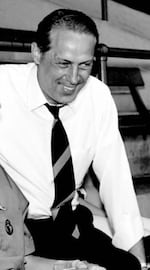
Former Portland Mayor Frank Ivancie
City of Portland Archives
Frank Ivancie, Portland’s mayor from 1980-1984, has died in California. He was 94.
The son of a Slovenian immigrant, Ivancie grew up in Minnesota and came to Oregon for graduate school. After serving in the U.S. Army Air Corps during World War II, he became a teacher in Burns, Orenco, and eventually Portland.
He left education to work as an executive assistant to Mayor Terry Schrunk in 1957, the start of Schrunk’s 16 years leading the city.
Ivancie was appointed to Portland City Council in 1966 to fill a vacancy and was reelected three times. A self-described conservative Democrat who led a “Democrats for Reagan” group in the 1980s, his support came from the city’s business communities, including working-class voters in east Portland and white-collared chamber of commerce types.
He was, in many ways, a representative of the way things used to work in Portland — back when it was a smaller city and downtown business interests tended to dictate city policy and dominate local politics.
As a City Council member, Ivancie railed against social change and urban planning; he opposed allowing gays and lesbians to serve in government and advocated strong and even harsh police response to Vietnam War protestors. He supported the Mount Hood Freeway, the eventually failed plan to turn U.S. 26 into a four-lane highway and rip large swaths of residential East Portland and Gresham along the way, and he opposed redeveloping Pioneer Courthouse Square as a large public square.
But he did make a lasting impact on the city: While mayor, he pushed for creation of the city's groundwater wells as a backup to the Bull Run Reservoir system. Work started on the city's first light rail line during his administration. And he helped open up the Willamette Riverfront to public use by razing the old Oregon Journal building.
Ivancie lost a mayoral race to Neil Goldschmidt in 1976. Four years later, he beat Mayor Connie McCready, another city commissioner who had been appointed to the city’s top office a year earlier when Goldschmidt resigned to become a member of President Jimmy Carter’s cabinet.
Ivancie’s politics were to the right of where Portland was headed, and his style was sometimes brusque, sometimes outright bullying.
“For the bulk of his term, he was rather feared by other politicians in the city and county,” Tim Hibbitts, a longtime Portland pollster said during a forum on Mayor Bud Clark’s 1984 victory of Ivancie several years ago. “The reality was Mayor Ivancie was reasonably popular, but by no means overwhelmingly popular.”
In 1984, a number of Ivancie’s city council colleagues, irked by both his hard-edged style and his conservative-leaning politics, considered running against him. When none stepped up, a group of liberal activists went recruiting.
They found Bud Clark, a neighborhood activist and tavern owner, whose upset victory over Ivancie ushered in an era in which Portland, already gaining national renown for its approach to urban growth, became nationally renowned for its liberal politics.
Out of office, Ivancie retired to Southern California.